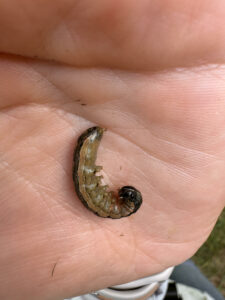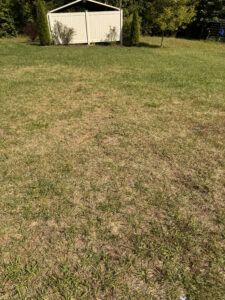Fall Armyworms in Caldwell County
go.ncsu.edu/readext?1031735
en Español / em Português
El inglés es el idioma de control de esta página. En la medida en que haya algún conflicto entre la traducción al inglés y la traducción, el inglés prevalece.
Al hacer clic en el enlace de traducción se activa un servicio de traducción gratuito para convertir la página al español. Al igual que con cualquier traducción por Internet, la conversión no es sensible al contexto y puede que no traduzca el texto en su significado original. NC State Extension no garantiza la exactitud del texto traducido. Por favor, tenga en cuenta que algunas aplicaciones y/o servicios pueden no funcionar como se espera cuando se traducen.
Português
Inglês é o idioma de controle desta página. Na medida que haja algum conflito entre o texto original em Inglês e a tradução, o Inglês prevalece.
Ao clicar no link de tradução, um serviço gratuito de tradução será ativado para converter a página para o Português. Como em qualquer tradução pela internet, a conversão não é sensivel ao contexto e pode não ocorrer a tradução para o significado orginal. O serviço de Extensão da Carolina do Norte (NC State Extension) não garante a exatidão do texto traduzido. Por favor, observe que algumas funções ou serviços podem não funcionar como esperado após a tradução.
English
English is the controlling language of this page. To the extent there is any conflict between the English text and the translation, English controls.
Clicking on the translation link activates a free translation service to convert the page to Spanish. As with any Internet translation, the conversion is not context-sensitive and may not translate the text to its original meaning. NC State Extension does not guarantee the accuracy of the translated text. Please note that some applications and/or services may not function as expected when translated.
Collapse ▲Fall armyworms were discovered the last week of August in a residential lawn in Caldwell County. These caterpillars are notorious for their rapid damage to turf. These caterpillars can devastate fescue lawns.
Fall armyworms do not overwinter in Caldwell County as they cannot survive the cold. These pests are not a problem every year. They come from Florida and the Gulf region carried by tropical storms. Most years, they do not make it to western North Carolina, but this year they did.
These pests arrive as adult moths. The female moth lays her eggs on vertical surfaces. Once hatched, the caterpillars drop to the ground and begin feeding. They continue to feed until they pupate in the soil and emerge as adults, restarting the cycle. This cycle takes about 3 weeks to complete.
These pests are particularly attracted to lush, well-managed lawns. If you maintain a nice lawn, you are much more likely to experience an infestation of fall armyworms. Regularly inspect your turf for signs of armyworms; early detection can prevent widespread damage. Look for patches in your yard that appear to need watering, as this is often the first sign noticed by homeowners.

Encouraging natural predators like birds is not an effective control strategy for fall armyworms. Although these caterpillars provide a good snack for birds, there simply aren’t enough birds to manage the infestation effectively. Insecticides, however, are very effective when applied early. The challenge lies in vigilance; if homeowners are not actively looking for signs of an infestation, it is often too late for effective control by the time the damage is noticed. If you are not vigilant, the caterpillars might have already transformed into moths and departed, rendering insecticide application ineffective at that point.
A preventative insecticide can be applied, which is absorbed into the grass and leaves, killing the armyworms when they feed. Acelepryn is recommended for home lawns, and Orthene for commercial turf.
Conserve is a product that poses a lower risk to pets and children. It is very effective but must be applied when caterpillars are present. Conserve is not effective as a preventative treatment; it should only be used when caterpillars are active.
Another generation of fall armyworms is expected this year before the first killing frost. Keep an eye out for areas in your yard that look like they need watering. If you identify the issue as fall armyworms, treat your yard immediately.

The mention of a brand or common name of a pesticide product does not imply endorsement by North Carolina State University nor discrimination against similar products not mentioned. Always read and follow the pesticide label.
Typically, we don’t have to worry about fall armyworms in Caldwell County, but I mentioned this the last time we had an issue, which was in 2021. If you have agricultural questions, please contact the N.C. Cooperative Extension, Caldwell County Center at 828-757-1290 or email me at seth_nagy@ncsu.edu.




